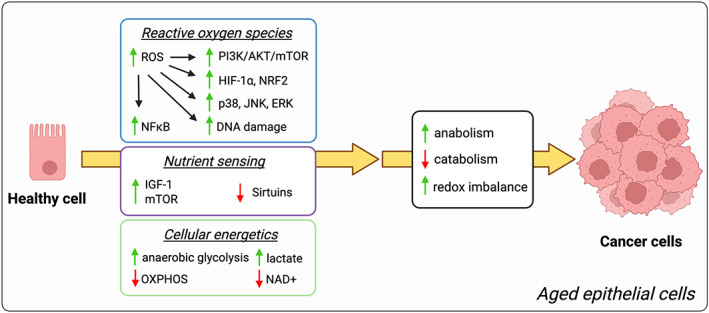Fig. 1.

Protumorigenic effects of aging‐associated metabolism in the epithelium. Aging promotes metabolic and redox rewiring, including an increase in ROS and the induction of a Warburg‐like metabolism, which leads to the activation of protumorigenic and proliferation controlling signaling pathways PI3K/AKT/mTOR, p38, JNK, and ERK, and the upregulation of protumorigenic transcription factors such as HIF‐1α, NRF2 or NF‐kB. On the other hand, aging also leads to the suppression of antitumorigenic pathways, including the inhibition of sirtuins via a decrease in NAD+. Together these age‐induced alterations create a metabolic environment in aged epithelial cells that empowers carcinogenesis. ERK, extracellular signal‐regulated kinase; HIF‐1 α, hypoxia‐inducible factor 1α; IGF‐1, insulin‐like growth factor 1; JNK, c‐Jun N‐terminal kinase; NAD, nicotinamide adenine dinucleotide; NF‐kB, nuclear factor‐kappa B; NRF2, nuclear factor erythroid 2‐related factor 2; OXPHOS, oxidative phosphorylation; p38, p38 mitogen‐activated protein kinase; PI3K/Akt/mTOR, phosphoinositide 3‐kinases/protein kinase B/mechanistic target of rapamycin; ROS, reactive oxygen species.
